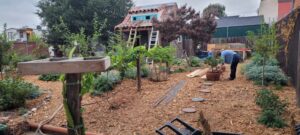EcoFarm Insight: Reflection, Observation & Irrigation
By Patrick Murphy, Program Manager
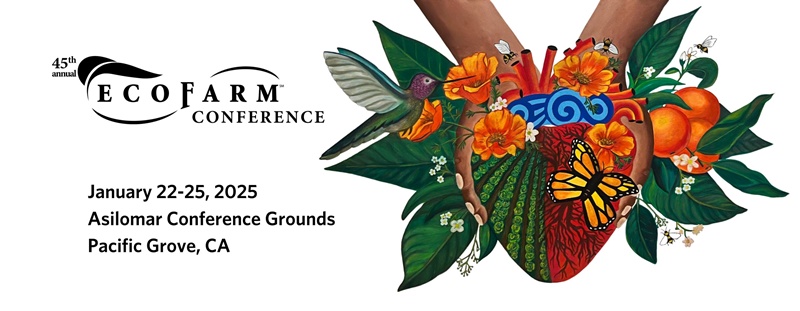
I had the opportunity to attend EcoFarm’s 45th Anniversary conference this year and had a wonderful time. My colleagues and I attended a variety of presentations and participated in a number of wonderful discussions with people from around California who work on similar projects related to urban agriculture, local food, and creating connections in their community.
There were a number of wonderful presentations that affirmed going back to basics like water retention, soil health, building up organic matter and biological activity, as well as taking your time to plan each project.
Again and again I heard from folks working in agriculture, education, farms and gardens that they had the most success when they took their time to reflect and observe before acting. Taking deliberate and well-paced steps to mulch, to build up organic matter in the soil, to increase water infiltration, and to develop rich and biologically active soil were the most impactful things they did. They stressed the importance of avoiding jumping into an idea that sounds good but is untested — the sheer force of nature is too powerful to work against.
Some key recommendations:
- Take your time when you’re planning, and revisit a site multiple times before beginning work, with and without your plans.
- Install a flow gauge and Schrader valves (similar to bicycle tire valves) in your irrigation system, and use a pressure gauge to check your system for leaks and issues.
- Heat stress can make plants more prone to pest issues.
Here is a breakdown of some of the presentations:
Regenerative Landscaper Erik Ohlsen gave a talk about the importance of getting to know a site. He said that to truly understand a location, you should be visiting it in the rain, at night and early morning, and you should always check and recheck your plans with the reality of what is on the ground. Ohlsen also stressed the number of career opportunities which exist in landscape design.
Cameron McDonald from Santa Cruz Resource Conservation District spoke about the importance of monitoring water systems using flow gauges and pressure gauges. McDonald spoke about how farmers (and homeowners) can balance design, operations and maintenance, and irrigation scheduling to maximize yield, conserve resources, minimize nutrient loss, ensure uniform crops, and reduce fuel costs.
The mantra was “You can’t know what you don’t measure” — measuring flow rates is essential, and tools like flow meters for home gardeners, or telemetry systems, data loggers, and remote data collection for large-scale operations provide an enormous amount of information. SRCD has a number of common recommendations they offer to improve efficiency on farms, (1) use pressure regulators (these $13 units have saved Sustainable Solano hours of work), (2) fix leaks, (3) add spaghetti lines to direct the flow of water and (4) opt for oval-shaped hoses to reduce accidental kinks.
McDonald reiterated the standard recommended pressures are 0-30 PSI for drip irrigation and 100 PSI for sprinklers. Proper pressure management is critical for uniform water application; use a hand pressure gauge and Schrader valves to check your systems pressure, use one hand gauge to check the whole system to ensure consistent calibration. Elevation changes also impact pressure — every 2.3 feet elevation changes PSI by 1 PSI (increasing PSI when descending down, decreasing PSI when going uphill). Be mindful of the water hammer effect, a rapid change of pressure caused by quickly turning on/off valves, and look for unexplained pressure loss. Everyone should be flushing their irrigation system more often (once per year at least) and install or use soil moisture sensors for better field or lawn management. By implementing these strategies, farmers and homeowners can optimize irrigation systems for efficiency, cost savings, and irrigation uniformity.
Bill Snyder gave a presentation on a study he and his graduate students conducted on whitefly infestations attacking squash crops. In a 2016-2017 drought, potato whitefly infestation exploded. They had a theory regarding bidirectional stress on cotton plants, where the larva of the whiteflies were born and developed. Cotton plants under extreme heat stress are unable to fight off white fly infections, while populations of bugs and animals which traditionally consume these insects are also decimated by heat stress and overuse of broad spectrum pesticides. Snyder and his team found correlation between these extreme droughts and high volumes of insecticide use (per acre). In a natural experiment using center-irrigated fields and increased mulching practices, the Georgia team feels confident that the combinations of heat stress on plants and insects were a driving cause in the rise of whitefly populations. Learn more about his research here.
Sustainable Solano would like to thank the California Department of Food and Agriculture, Solano County Public Health and CHIP (the Child Health and Improvement Plan) for their support to attend the 45th EcoFarm Conference. Their support allowed us to learn so much about the state of urban agriculture, local food, and what other folks in our state, community and nation are working on. Thank you to the presenters and all the friends we made along the way.

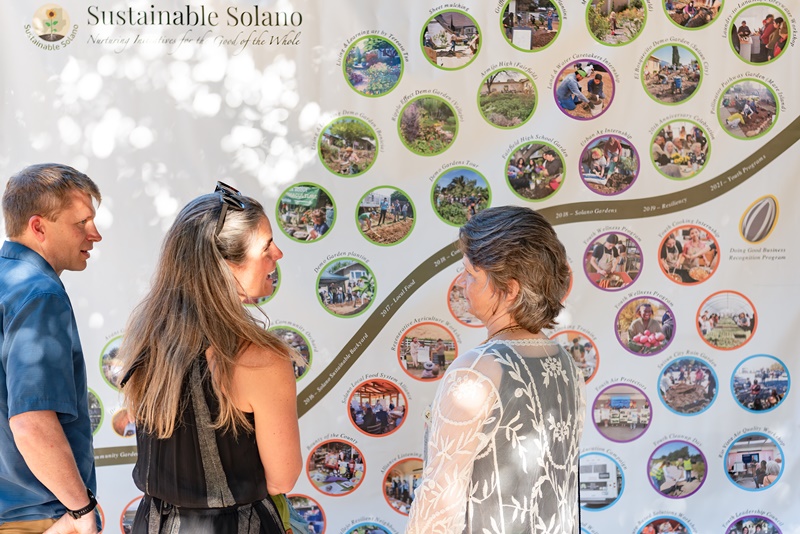
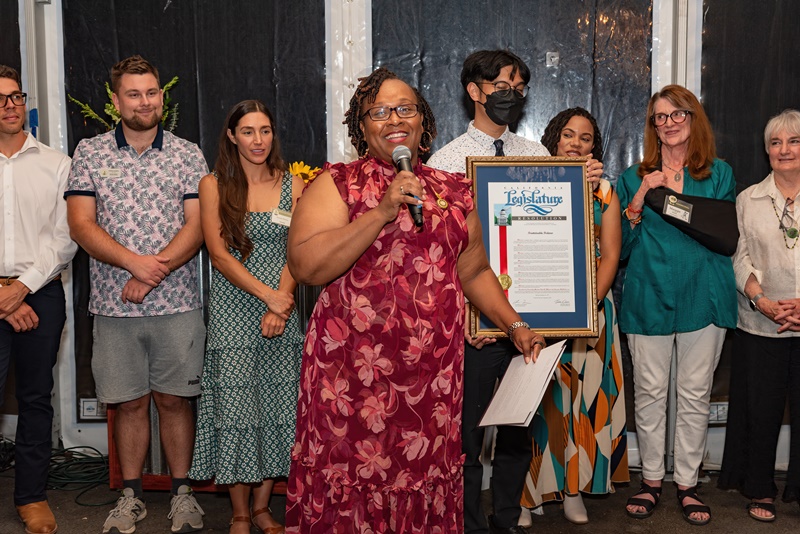
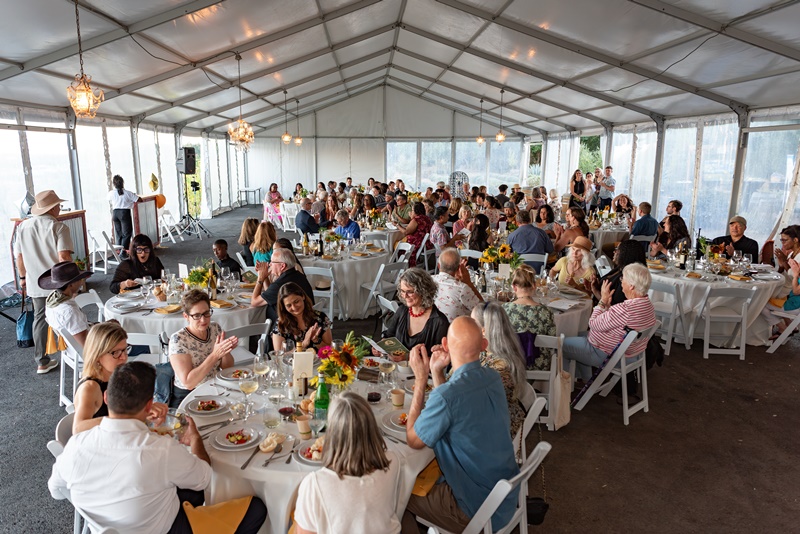
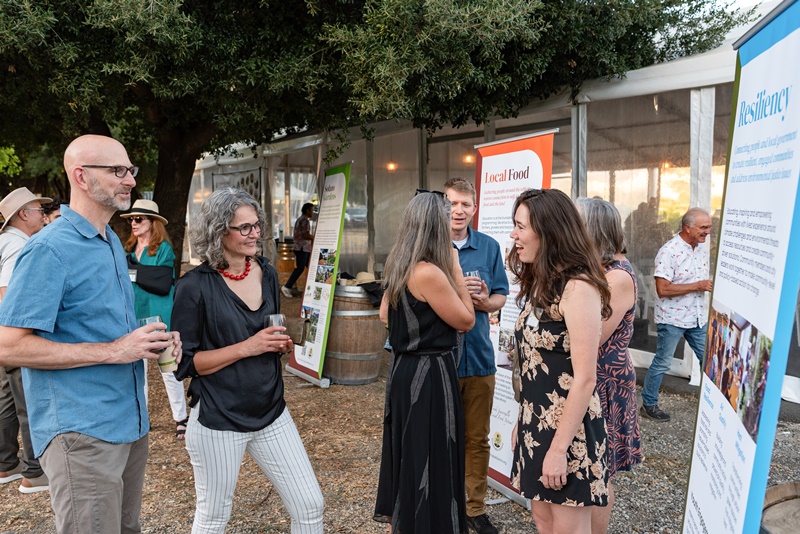
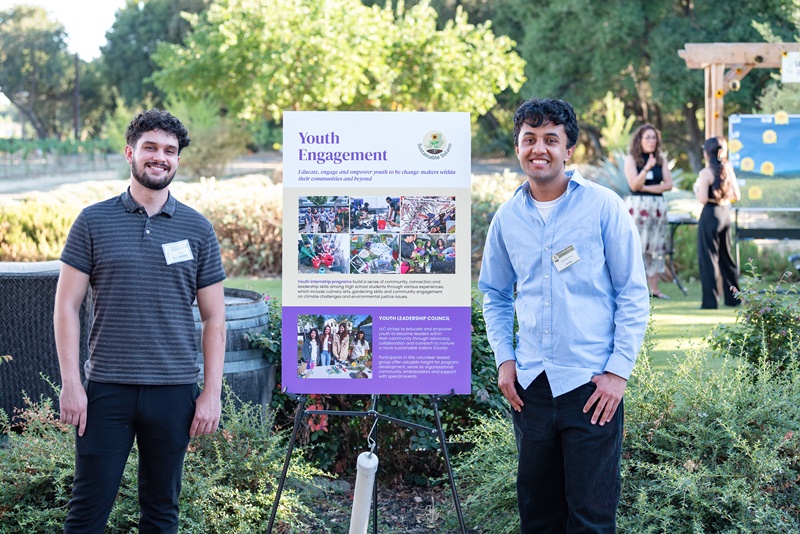
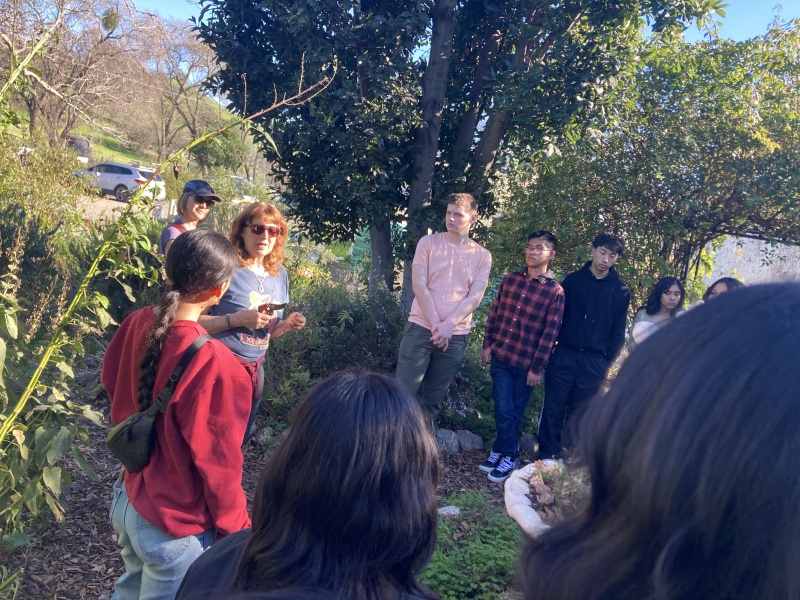
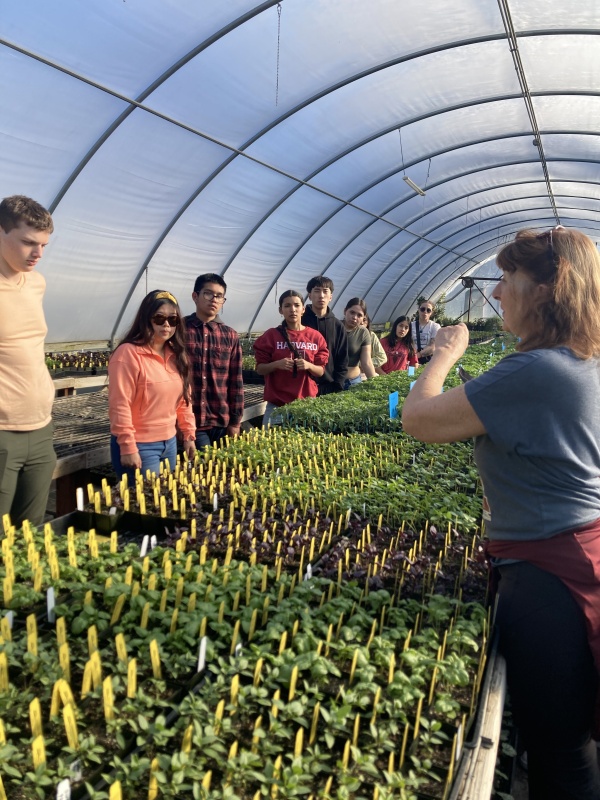
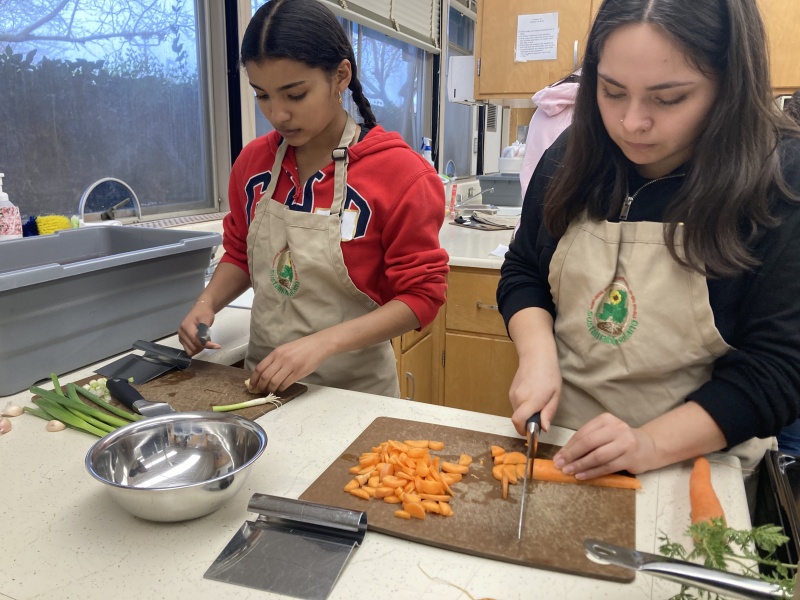
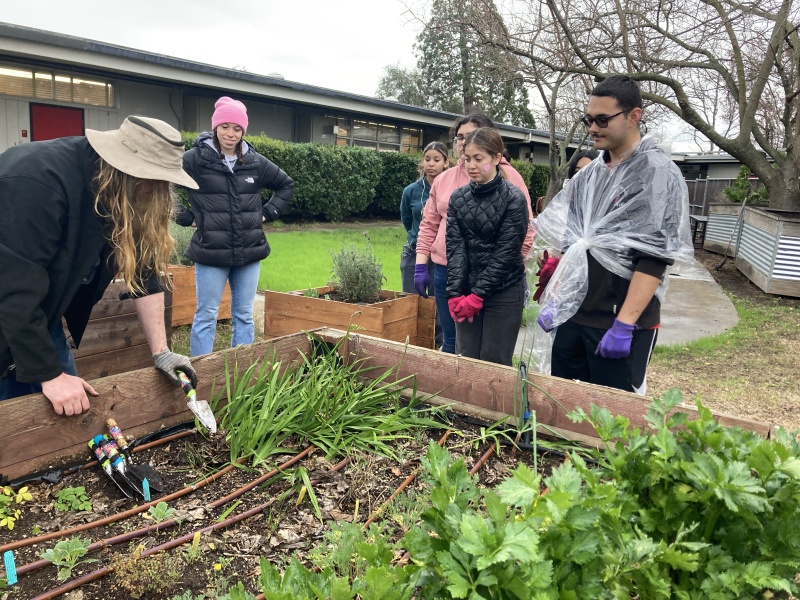
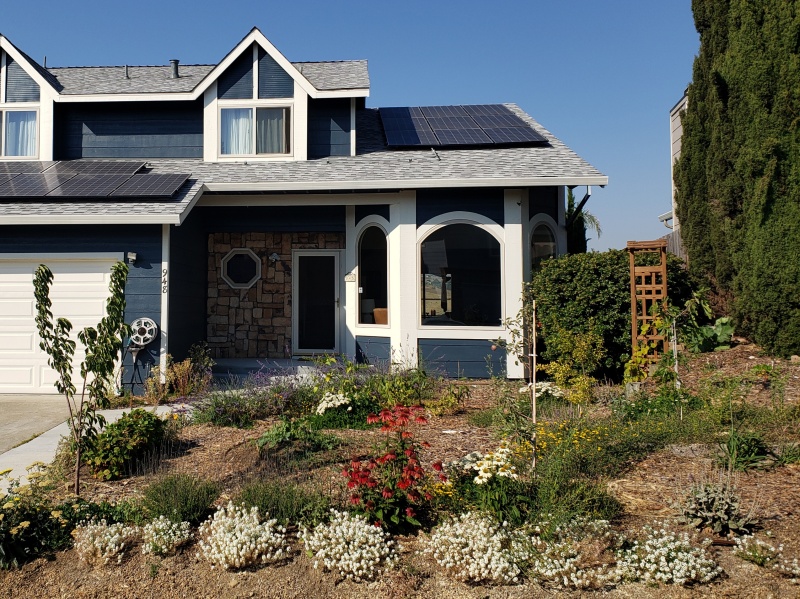
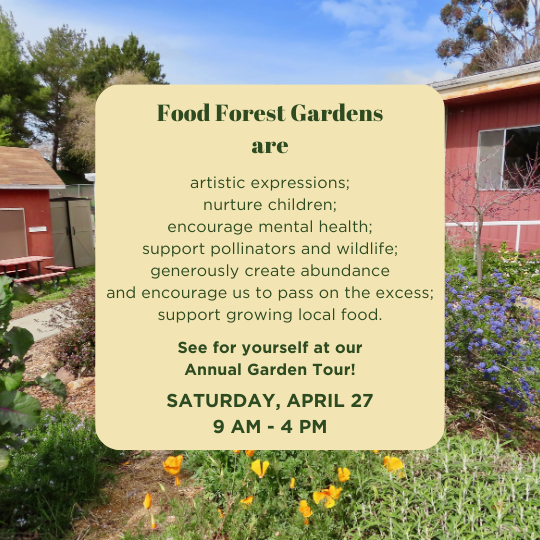
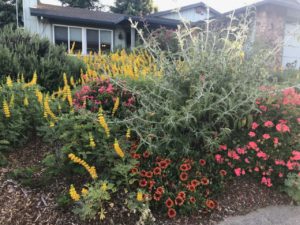 Mature front yard food forest has mostly fruit trees and native plants that attract pollinators year-round. It has a laundry-to-landscape greywater system.
Mature front yard food forest has mostly fruit trees and native plants that attract pollinators year-round. It has a laundry-to-landscape greywater system.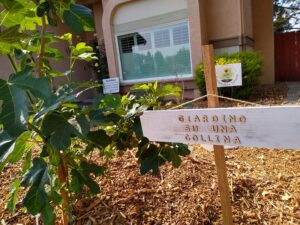 A 4-year-old food forest and pollinator garden installed in 2020 that includes a swale that captures roof water and mediterranean trees and plants mixed with native pollinating and nectar plants to attract bees and butterflies. This site is home to a Monarch Waystation that grows a variety of plants to support Western Monarch Butterflies.
A 4-year-old food forest and pollinator garden installed in 2020 that includes a swale that captures roof water and mediterranean trees and plants mixed with native pollinating and nectar plants to attract bees and butterflies. This site is home to a Monarch Waystation that grows a variety of plants to support Western Monarch Butterflies.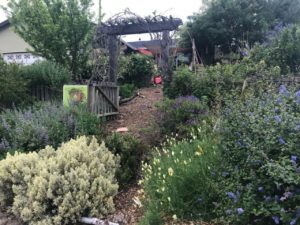 A 9-year-old established food forest with two swales that are dug out and refreshed every 2-3 years, laundry-to-landscape greywater to fruit trees, and chickens. The drip irrigation system was removed four years ago and the garden is thriving! Annual beds are hand-watered once a week during the growing season. Greyhawk Grove is a “high-traffic-survival-of-the-fittest-have-three-young-children garden”. There may be lemonade and baked goods for sale by children, as well as products from the garden to give away (dried calendula, lavender, herbs, eggs, fruit, etc.).
A 9-year-old established food forest with two swales that are dug out and refreshed every 2-3 years, laundry-to-landscape greywater to fruit trees, and chickens. The drip irrigation system was removed four years ago and the garden is thriving! Annual beds are hand-watered once a week during the growing season. Greyhawk Grove is a “high-traffic-survival-of-the-fittest-have-three-young-children garden”. There may be lemonade and baked goods for sale by children, as well as products from the garden to give away (dried calendula, lavender, herbs, eggs, fruit, etc.).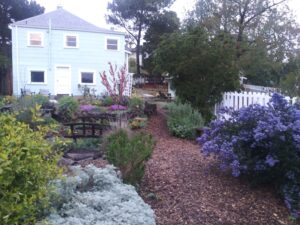 Southern slope food forest focused on pollinators, shrubs and native plants. It also includes fruit trees, perennial and edible plants, swales and a laundry-to-landscape greywater system.
Southern slope food forest focused on pollinators, shrubs and native plants. It also includes fruit trees, perennial and edible plants, swales and a laundry-to-landscape greywater system.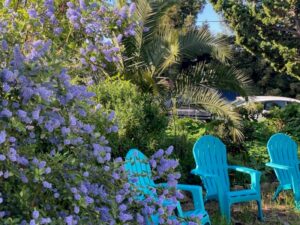 An evolving food forest garden and greywater system installed as part of Sustainable Solano’s 2022-23
An evolving food forest garden and greywater system installed as part of Sustainable Solano’s 2022-23 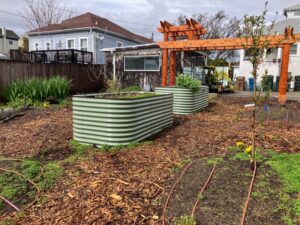 This homeowner attended our tours and was inspired to transform his yard! This garden, designed by Michael Wedgley of
This homeowner attended our tours and was inspired to transform his yard! This garden, designed by Michael Wedgley of 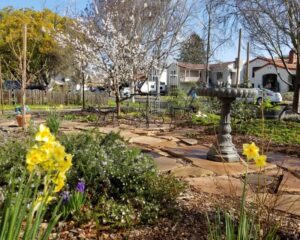 This front yard lawn was replaced in
This front yard lawn was replaced in 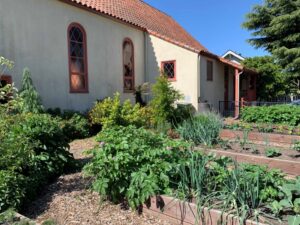 Two separate gardens, one is a peace garden with mostly flowers, cactus and trees and the other is the vegetable garden, called Johnson Ranch. The vegetable garden was revived through the
Two separate gardens, one is a peace garden with mostly flowers, cactus and trees and the other is the vegetable garden, called Johnson Ranch. The vegetable garden was revived through the 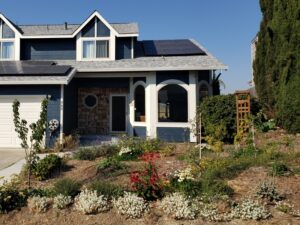
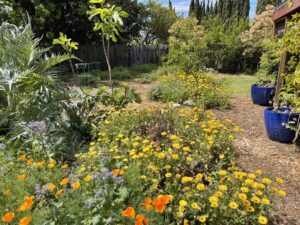 Morningside Botanical Bounty food forest was created as part of the
Morningside Botanical Bounty food forest was created as part of the 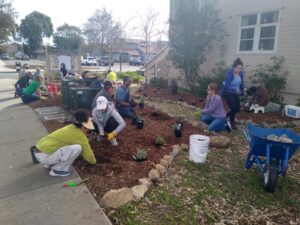 Pollinator food forest garden filled with a variety of California native plants that support the habitat of butterflies, bees, moths, wasps, hummingbirds and so much more. This garden was installed in February 2023 as a collaboration with a variety of organizations including Vallejo People’s Garden, Vallejo Project, Solano Resource Conservation District and Monarch Milkweed Project. Alanna Mirror wrote three songs inspired by the installation, featured in her
Pollinator food forest garden filled with a variety of California native plants that support the habitat of butterflies, bees, moths, wasps, hummingbirds and so much more. This garden was installed in February 2023 as a collaboration with a variety of organizations including Vallejo People’s Garden, Vallejo Project, Solano Resource Conservation District and Monarch Milkweed Project. Alanna Mirror wrote three songs inspired by the installation, featured in her 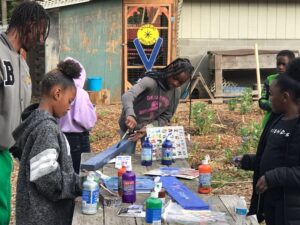 Vallejo Project’s Unity Garden initiative restored an abandoned lot that was once filled with sand and garbage and turned it into a multi-level food forest with internationally influenced farming techniques, a mealworm farm and chickens. This garden is focused on urban agriculture.
Vallejo Project’s Unity Garden initiative restored an abandoned lot that was once filled with sand and garbage and turned it into a multi-level food forest with internationally influenced farming techniques, a mealworm farm and chickens. This garden is focused on urban agriculture.